Challenges ahead for PM Modi
and Opposition leaders
Hari Jaisingh
I am not predicting an
outcome of Narendra Modi’s
2019 election march. This is
not the job of a professional
journalist. This is for the
people to decide. They have
their own likes and dislikes
and whims and fancies.
Barring some exceptional
cases, there is no uniform
standard in the way the
people think and act. This is
the beauty of our vibrant
democracy. Even Atal Bihari
Vajpayee’s ‘India shining’ poll
campaign did not click,
despite his good
performance as PM.
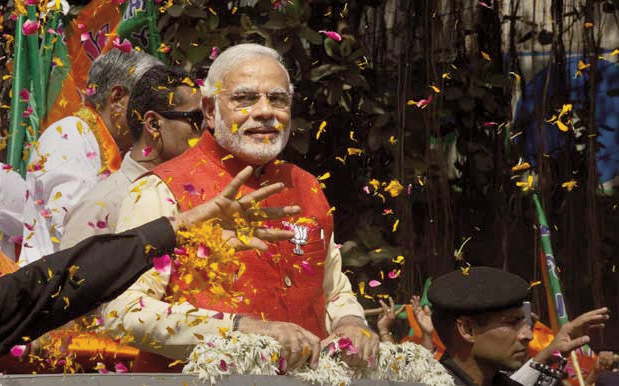 The day Narendra Modi's BJP painted the nation saffron
Will BJP leader
Narendra Modi’s
magical feat of
the May 2014
poll get
repeated in the
seven-phase election of 2019? I
cannot be so sure, since Prime
Minister Modi is already under the
spell of the Law of Diminishing
Return in view of certain gaps in
his credibility, notwithstanding the
fact that his popularity graph in
the post-Balakot air strike is on the
high side vis-a-vis other leaders. The strength of PM Modi is his
powerful rhetoric at public rallies.
He speaks convincingly, even
though the tone of his speech
might not reflect ground realities.
The day Narendra Modi's BJP painted the nation saffron
Will BJP leader
Narendra Modi’s
magical feat of
the May 2014
poll get
repeated in the
seven-phase election of 2019? I
cannot be so sure, since Prime
Minister Modi is already under the
spell of the Law of Diminishing
Return in view of certain gaps in
his credibility, notwithstanding the
fact that his popularity graph in
the post-Balakot air strike is on the
high side vis-a-vis other leaders. The strength of PM Modi is his
powerful rhetoric at public rallies.
He speaks convincingly, even
though the tone of his speech
might not reflect ground realities.
In a diverse polity like India,
ground realities keep changing
after a cluster of 30 to 35
districts. So, the nature of P M
Modi’s promises has to change
as plans of actions thereto. Small wonder that the level of
poverty and development varies
from State to State. My simple
point is: In PM Modi’s Gujaratcentric model of development,
the whole country’s dreams and
realities do not fit in.
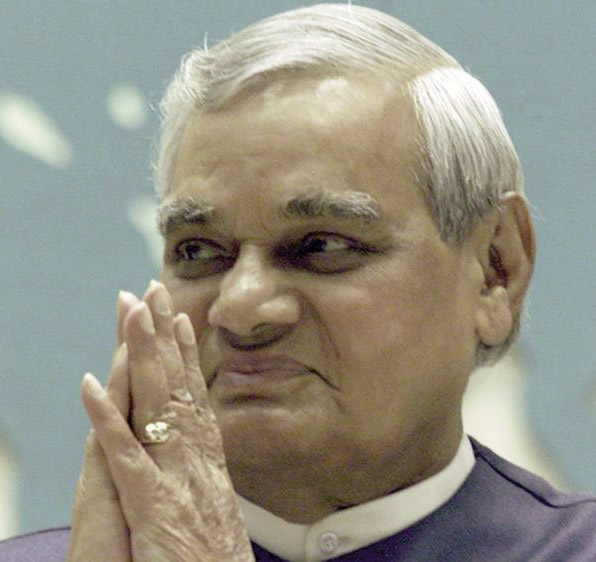 Atal Bihari Vajpayee
I am not predicting an outcome
of Narendra Modi’s 2019 election
march. This is not the job of a
professional journalist. This is for
the people to decide. They have
their own likes and dislikes and
whims and fancies. Barring some
exceptional cases, there is no
uniform standard in the way the
people think and act. This is the
beauty of our vibrant democracy.
Even Atal Bihari Vajpayee’s
‘India shining’ poll campaign did
not click, despite his good
performance as PM.
Atal Bihari Vajpayee
I am not predicting an outcome
of Narendra Modi’s 2019 election
march. This is not the job of a
professional journalist. This is for
the people to decide. They have
their own likes and dislikes and
whims and fancies. Barring some
exceptional cases, there is no
uniform standard in the way the
people think and act. This is the
beauty of our vibrant democracy.
Even Atal Bihari Vajpayee’s
‘India shining’ poll campaign did
not click, despite his good
performance as PM.
Even the dynasty, ideological,
stability and personality labels
may or may not click. Herein lies
the importance of coalition
regimes in a diverse country like
ours. What matters most in India’s
complex poll mathematics is the
spirit of India that derives its
strength from people’s varied local
and regional ground realities.
I do not wish to get into the poll
arithmetic. This job be better left
to the pollsters. I would confine
myself to the existing ground
realities and leave emotional
matters to the electorate. Here, I
cannot be sure whether the glass
of people’s security concerns is
half full or half empty as 90 crore
voters get set for elections from
April 11 to May 19, including 1.5
crore first time voters who might
hold the key to the final verdict on May 23.
 Farmers’ protest
Farmers’ protest
My first area of concern
is visible signs of rural
unrest which we saw
even on the streets of
state capitals, New
Delhi included. Rural
voters seem to be an
unhappy lot on the
Modi government’s
overall performance on
the agricultural and
employment fronts.
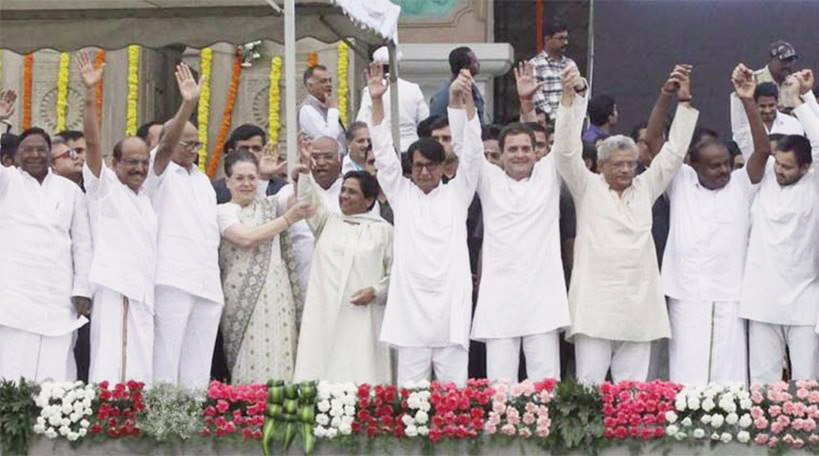 Mahagathbandhan of opposition parties?
I also wish to leave aside
respective strength of the BJP-led
National Democratic Alliance, the
Congress-controlled UPA, the yetto-emerge Third Front and the
proposed Mahagathbandhan of
certain opposition parties. My first
priority is to focus on varied issues
which are uppermost in the minds
of people across the country.
Mahagathbandhan of opposition parties?
I also wish to leave aside
respective strength of the BJP-led
National Democratic Alliance, the
Congress-controlled UPA, the yetto-emerge Third Front and the
proposed Mahagathbandhan of
certain opposition parties. My first
priority is to focus on varied issues
which are uppermost in the minds
of people across the country.
My first area of concern is
visible signs of rural unrest which
we saw even on the streets of state
capitals, New Delhi included. Rural
voters seem to be an unhappy lot
on the Modi government’s overall
performance on the agricultural
and employment fronts.
Of course, P M Modi has
announced a number of grand
schemes to mitigate problems of
the rural sector. But, pre-poll
makeshift rural plans are unlikely
to work on the ground since the
rural distress is multidimensional.
These require long-term solutions
– something beyond the
comprehension of the present
regime.
Even demonetization showed P
M Modi’s lack of “home work” on
rural ground realities. I have
brought the Bharat unrest issue to
the fore since the hopes of rural
voters played a major role behind
the 2004 poll success of Narendra
Modi.
The second key issue is dismal employment growth. P M Modi
had promised generation of 2
crore jobs annually. The Modi
establishment, of course, has its
own data on the job front, which,
according to some critics, are
“doctored”. However, the very fact
that young Indians had come out
openly on the streets of Delhi,
cannot be taken lightly. We know
how lakhs and lakhs of jobs were
lost in the informal sector
following P M Modi’s supposedly
master stroke of demonetization.
This was a flop show as was the
dream concept of ‘Make-in-India’
because of gaps in domestic and
foreign investments. The facts in
these areas speak louder than
official claims.
The NSSO job report, which the
government has so far not
released, reportedly suggests that
3.2 crore casual labourers lost
their jobs in rural India between
2011-12 and 2017-18. The actual
size of India’s male workforce, too,
has shrunk. A shrinking workforce
suggests the rise in the numbers of
unemployed and also points to
fewer job opportunities. This has
indeed been the tragedy of India’s
development story.
Other factors that could prove
to be crucial in the forthcoming
election are national security. This
is the Modi governments’ big plus
point, provided he and his team
are able to sustain the voters’
emotional response till the voting
is over. However, the factors of
gau raksha and minorities’
grievances could go against P M
Modi. As for the caste calculus of
providing 10 per cent quota to the
upper class, I cannot be sure of the
intensity of counter-reaction from
Dalits
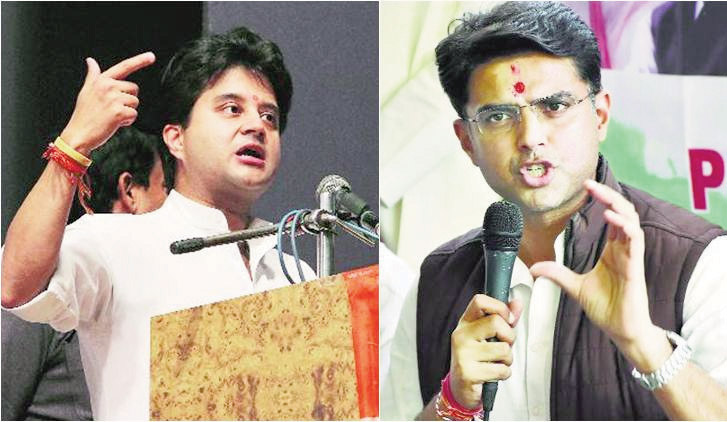 Jyotiraditya Scindia and Sachin Pilot
Jyotiraditya Scindia and Sachin Pilot
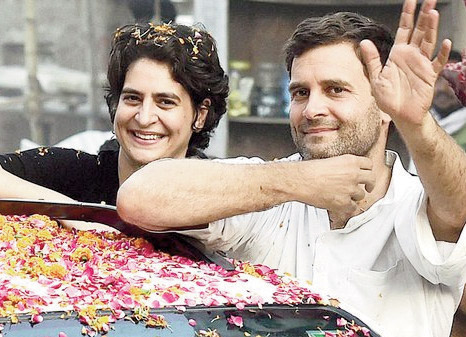 Priyanka Gandhi and Rahul Gandhi
Equally crucial are the promised
deposit of Rs 15 lakh in every
account from the flow of foreign
black money, the working of
populist welfare schemes,
inflation, the changing mindset of
young voters etc. These issues
might show P M Modi’s
vulnerability vis-à-vis the
Congress’s young leaders like
Sachin Pilot, Jyotiraditya Scindia,
Priyanka Gandhi and Rahul
Gandhi. They might be lacking the
requisite experience and maturity.
All the same, their assertive
presence in the Congress cannot
be overlooked.
Priyanka Gandhi and Rahul Gandhi
Equally crucial are the promised
deposit of Rs 15 lakh in every
account from the flow of foreign
black money, the working of
populist welfare schemes,
inflation, the changing mindset of
young voters etc. These issues
might show P M Modi’s
vulnerability vis-à-vis the
Congress’s young leaders like
Sachin Pilot, Jyotiraditya Scindia,
Priyanka Gandhi and Rahul
Gandhi. They might be lacking the
requisite experience and maturity.
All the same, their assertive
presence in the Congress cannot
be overlooked.
A potentially versatile
leader should be able to
remould himself. He
should know all his plus
and minus points. This
requires proper
feedback from the
ground, delinked from
the sycophancy culture.
This is applicable to P M
Modi as well as to all
Opposition leaders, if
they are serious about
the people’s
development. The real
challenge before the
leadership today is: How
to revive the basic faith
of people in the nation’s
destiny? India has a
composite culture. All its
elements have to be
strengthened at the
grassroots.
There are, of course, several
unknown factors which could cut
across the political divide. A lot will
depend on exploitation of varied
issues by the Opposition leaders,
the Congress included.
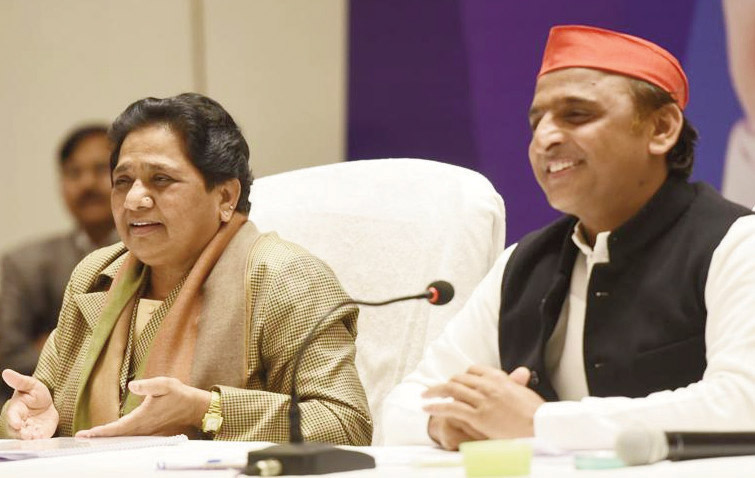 Mayawati and Akhilesh Yadav
Regrettably, Rahul Gandhi is
not well focused on people’s
issues which could sway the
voters in his favour. His hammering on the Rafale deal
could prove to be counterproductive in view of the party’s
own shaky track record on
various past defence
agreements. For the present, P
M Modi’s old campaign on
Congress-Mukt-Bharat has not
clicked as its recent success in
the three Assembly elections
shows. We also need to watch
the effectiveness of Akhilesh
Yadav’s SP and Mayawati’s BSP,
especially Mulayam Singh Yadav
has distanced himself from his
son in UP.
Mayawati and Akhilesh Yadav
Regrettably, Rahul Gandhi is
not well focused on people’s
issues which could sway the
voters in his favour. His hammering on the Rafale deal
could prove to be counterproductive in view of the party’s
own shaky track record on
various past defence
agreements. For the present, P
M Modi’s old campaign on
Congress-Mukt-Bharat has not
clicked as its recent success in
the three Assembly elections
shows. We also need to watch
the effectiveness of Akhilesh
Yadav’s SP and Mayawati’s BSP,
especially Mulayam Singh Yadav
has distanced himself from his
son in UP.
For that matter, the BJP’s
concept of Nationalism as a
vehicle of anti-colonial politics
has failed to stop Hindu-Muslim
antagonism. Internal
“contradictions and conflicts”
have not taken Nationalism to
the dizzy height the BJP had
hoped for. Here I go by the
Nationalism version of Annie
Besant who portrays it as
something that originated in
India’s ancient past and “flowed
in an unbroken continuum into
modern times” The BJP
leadership, however, has to
view Mordern India as an allinclusive communities giving
beyond Hinduism.
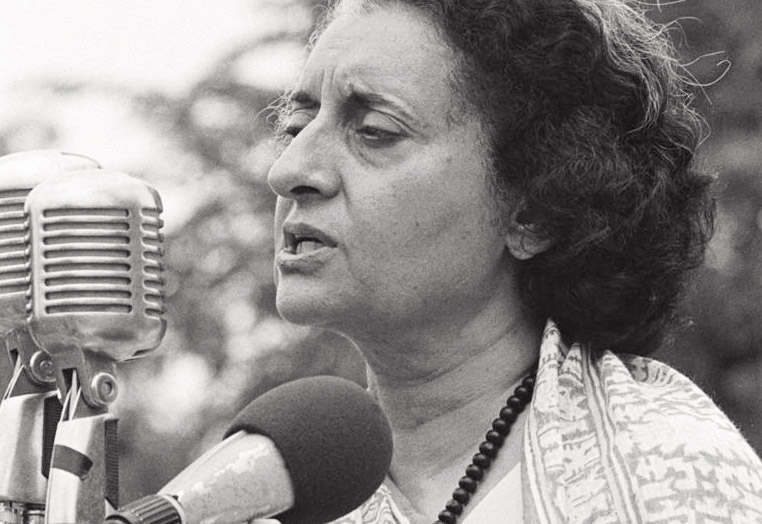 Mayawati and Akhilesh Yadav
A country of India’s size
requires constant monitoring of
ground realities. It cannot be
guided or governed with the help
of convenient mindsets of
advisers. Narendra Modi may
recall that Indira Gandhi’s tragedy
was she made tall promises
without caring for follow-up
action. She overlooked the fact
that mere populist policies and
programmes could win her votes,
but could not banish poverty. In
the absence of follow-up actions
all her populist high-sounding
slogans failed to alleviate the
people’s miseries.
Mayawati and Akhilesh Yadav
A country of India’s size
requires constant monitoring of
ground realities. It cannot be
guided or governed with the help
of convenient mindsets of
advisers. Narendra Modi may
recall that Indira Gandhi’s tragedy
was she made tall promises
without caring for follow-up
action. She overlooked the fact
that mere populist policies and
programmes could win her votes,
but could not banish poverty. In
the absence of follow-up actions
all her populist high-sounding
slogans failed to alleviate the
people’s miseries.
A potentially versatile leader
should be able to remould himself.
He should know all his plus and
minus points. This requires proper feedback from the ground,
delinked from the sycophancy
culture. This is applicable to P M
Modi as well as to all Opposition
leaders, if they are serious about
the people’s development. The
real challenge before the
leadership today is: How to revive
the basic faith of people in the
nation’s destiny? India has a
composite culture. All its elements
have to be strengthened at the
grassroots.
A potentially versatile
leader should be able to
remould himself. He
should know all his plus
and minus points. This
requires proper
feedback from the
ground, delinked from
the sycophancy culture.
This is applicable to P M
Modi as well as to all
Opposition leaders, if
they are serious about
the people’s
development. The real
challenge before the
leadership today is: How
to revive the basic faith
of people in the nation’s
destiny? India has a
composite culture. All its
elements have to be
strengthened at the
grassroots.
Strengthening of the cultural
bonds apart, India has to be a land
of opportunities. In this context, I
must reiterate that the ushering of
economic swaraj can help the
people of all shades and opinions
to revive the faith in the nation’s
destiny.
There are, of course, loose ends
everywhere. Politicians exploit the
innocent masses. Businessmen
and traders exploit consumers by
selling substandard commodities.
Bureaucrats exploit the system
without caring for the
susceptibilities of the poor and the
have-nots. The guardians of the
law tilt towards the rich and the
mighty.
All these issues can be
resolved by comprehensively
reforming the system and
rearranging national priorities
of development, such as,
drinking water for villages,
halting deforestation ruthlessly,
vigorous drive to check the
“baby boom”, improving the
quality of education, generating
new employment opportunities
by giving a boost to rural
cottage, small industries and
creating rural and urban
infrastructure in key areas of
the economy.
This is just an illustrative list.
The stress has to be on critical
areas of social and economic
activities, and less on rhetoric and
false promises. Herein lies
opportunities for Narendra Modi
and Opposition leaders to Think
Big and Act Big.



